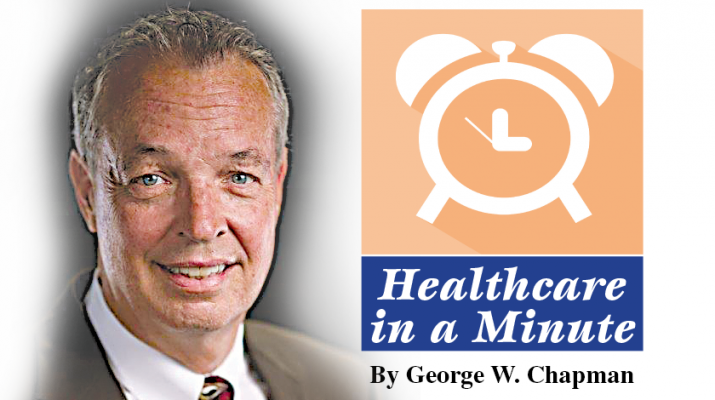By George W. Chapman
The FDA has made clear it will not take potentially dangerous short cuts when granting emergency authorization to vaccine producers. The White House, eager to get a vaccine approved by the election, has reluctantly acquiesced to the FDA’s authority, expertise and caution. Front runners Pfizer and Moderna believe they will qualify for FDA emergency authorization possibly in December. Providers, first responders, seniors and people with comorbidities will be among the first to be vaccinated in 2021. Whether or not the vaccine will be “free” is undetermined as of this writing.
Big Tech Health Insurance
Despite increasing scrutiny over their potentially monopolistic practices, big tech giants Google, Amazon, Facebook and Apple are venturing into tech driven health insurance. It begins with their wearable monitoring devices which gives them remote and live access to considerable and significant personal health data. Google has already launched their insurance company called Verily. Amazon offers employees coverage through its spinoff called Haven. It plans to offer it to its 900,000-plus U.S. e-commerce sellers. Big tech enters the health insurance market with literally billions to invest. Traditional commercial health plans like the Blues, Aetna and Cigna are limited by law to no more than 20% profit on their premiums. Any “profit” above 20% must be refunded to the buyer. (They are allowed up to three years to settle.) As long as there is the Affordable Care Act, the 20% profit ceiling should also apply to the big tech newcomers. The billions needed to survive in the industry, then, will come from other operations. Big Tech will reap unlimited profits in wearable devices, internet sales, phones and advertising. Traditional health insurers are merging with retail drug chains where profits are not limited. If the Supreme Court determines the entire Affordable Care Act is unconstitutional early next year, expect your healthcare premiums to skyrocket as the 20% restriction on profits disappears.
Uninsured Increasing
The impact of the pandemic is evident in fatalities, increased social anxiety, a faltering economy and loss of jobs. It is estimated that as many as 8 million workers will lose their jobs temporarily, if not permanently. Consequently, they will lose their employer based or sponsored health insurance. If the ACA is struck down, subsidized commercial insurance plans on the exchanges will no longer be an option as it is currently for 20 million Americans. Physicians and hospitals, already in financial peril due to the pandemic, are understandably concerned about the further strain on their revenue sources as patients lose their better paying commercial insurance plans. The newly uninsured who qualify based on income, will be covered by Medicaid. Those who don’t qualify may decide individual commercial insurance is too expensive and risk being uninsured. Health insurance, for most under 65, has traditionally been employer-based. The ACA was designed to offer an alternative to employer-based plans.
Hospital COVID-19 Reporting
CMS Chief Seema Verma is giving non-compliant hospitals three to four months to get up to speed with daily COVID-19 reporting requirements. If they fail to comply, they will lose their participation in Medicaid and Medicare. Among the required daily COVID-19 related stats are: deaths, hospitalizations, ICU admissions, number of ventilators, staffing shortages and remdesivir inventory. In the middle of a pandemic, this seems like a rather reasonable requirement from CMS which pays hospitals for treating patients with COVID-19 and related comorbidities. Incredibly, the knee jerk reaction from the American Hospital Association is call the reporting requirements overly burdensome and overkill.
Physician Burnout Rising
An international survey of 7,500 physicians, conducted by Medscape, revealed an unsurprising increase in burnout combined with a precipitous decrease in income. Five thousand of the respondents were U.S. physicians. About 25% of U.S. docs said they plan to retire earlier with 64% reporting feeling burned out. Nine percent of U.S. physicians reported 76% to 100% lost income; 14% lost 51% to 75%; 28% lost 26% to 50% and 33% lost 11% to 25% of their income compared to last year. Basically, about half of the reporting physicians lost at least a quarter of their income due to the pandemic. The larger drops in income were among ophthalmologists, allergists, plastic surgeons and ENTs. About 54% of the physicians surveyed treated a patient with COVID-19 and 6% of the physicians got infected. Food was the top source of comfort. To make matters worse for physicians, recalcitrant and rude patients are contributing to staff and provider burnout. Agitated patients are complaining about masks or outright refusing to wear them. Others are arguing with staff about restrictive visitor policies. While the reported occurrences are rare, they are deeply upsetting to already frazzled staff. Please understand and be nice!
Employer-based Care 2021
The Business Group on Health revealed employer plans for 2021. The pandemic has clearly impacted how they will approach next year. Most commercial insurers and self- funded plans have experienced significant decreases in claims and utilization this year, so 2021 premiums increases are expected to be in the 0% to 4% range. (Neither employers nor insurers are sure of the eventual impact of pent-up demand on costs.) Fifty-seven percent of employers said they do not plan on shifting more out of pocket costs to their employees. Fifty-three percent are interested in expanding virtual healthcare where they will also cover chronic care management, mental health, prenatal care and weight management. There seems to be an increase in employer empathy for the plight of their workers. Sixty-one percent plan to provide clinics on site. Eighty-one percent plan on directing employees to condition specific centers of excellence.
George W. Chapman is a healthcare business consultant who works exclusively with physicians, hospitals and healthcare organizations. He operates GW Chapman Consulting based in Syracuse. Email him at gwc@gwchapmanconsulting.com.

